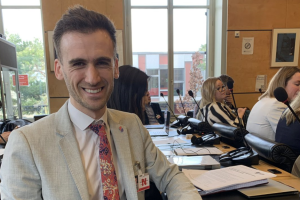We are committed to ending all forms of forced non-therapeutic genital cutting.
This includes female genital mutilation (FGM) and ritual circumcision of boys.
A child's right to bodily autonomy must not be overridden by other people's religious or cultural beliefs.
The National Secular Society supports a person's most fundamental right to grow up with an intact body and to make their own choices about permanent bodily modifications.
All forms of forced cutting on children's genitals breach basic child rights and safeguarding guidance.
Several communities have genital cutting traditions, often rooted in religious beliefs. But children, and particularly babies and young infants, are incapable of giving consent to such medically unnecessary, harmful, painful and permanent procedures.
Sometimes health benefits for non-therapeutic genital cutting are claimed despite the evidence to the contrary. All forms of forced genital cutting risk serious emotional, sexual, and physical harm – including death.
Child safeguarding must always be prioritised above the desire of adults to express their belief through forced cutting of children's genitals.
Female genital mutilation (FGM)
"It is irrelevant whether or not a person believed the operation to be necessary in the child's best interests as a matter of custom or ritual."
We are committed to the eradication of forced genital cutting of girls and women known as Female Genital Mutilation (FGM) in all its forms.
There are thought to be well over 100,000 women and girls affected by FGM living in the UK. We work with like-minded organisations to protect girls from the harm of forced genital cutting.
FGM practices vary. Some forms involve a pinprick or the removal of a small amount of tissue from the clitoris. Other forms include complete removal of the clitoris and labia, and stitching the vulva closed. Communities which practice FGM often cite religion as a motivation.
All forms of FGM are child abuse and are rightly illegal in the UK. But some British girls are still unprotected. Some have been sent abroad to undergo the procedure and others are having it performed secretly in this country.
There has been only one successful prosecution for FGM since it was banned in 1985. We are concerned that fear of upsetting cultural and religious sensitivities is preventing authorities from tackling FGM effectively.
"...a right specifically for African families who want to carry on their tradition whilst living in this country"
As with all forms of forced genital cutting, those who speak out against FGM are often accused of disrespecting their parents or cultural heritage, and of over-dramatising a 'minor' procedure that others 'don't complain about'. Together with the perceived humiliation of speaking about one's own genitals, these factors combine to ensure that many sufferers are reluctant to speak out.
Ending FGM requires sustained civil society action to change attitudes and inform girls of their rights.
Male circumcision
While all forms of FGM are rightfully banned, non-therapeutic circumcision of boys is permitted in UK law.
The foreskin is a normal body part with physical, sexual and immunological functions. Removing it from non-consenting children has been associated with various physical and psychological difficulties. These are likely to be greatly under-reported because people who have experienced sexual harm are often reluctant to reveal it as societal dismissal or stigmatisation may compound the harm.
Circumcision is excruciatingly painful. When performed on babies, little to no anaesthesia is used. Even when performed under anaesthesia on older children, the recovery entails weeks of pain and discomfort.
The procedure is also dangerous. Between 1988 and 2014, there were 22,000 harms recorded by the NHS resulting circumcision. They included scarring and full penis amputation. In 2011, nearly a dozen infant boys were treated for life-threatening haemorrhage, shock or sepsis as a result of non-therapeutic circumcision at a single children's hospital in Birmingham. In 2007, a newborn baby went into cardiac arrest minutes after he was circumcised in a London synagogue, and subsequently died.
Any claims of marginal health benefits of circumcision are extremely contested. No national medical, paediatric, surgical or urological society recommends routine circumcision of all boys as a health intervention. There is now growing concern among doctors that existing ethical principles of non-therapeutic childhood surgery should no longer include an exception for non-therapeutic circumcision.
62% of Brits would support a law prohibiting the circumcision of children for non-medical reasons. Only 13% would oppose it.
There is very limited regulation of non-therapeutic circumcision in the UK. We do not know how many such procedures are performed annually or the degree of harm, as there is no requirement for any follow up or audit and the boys themselves are too young to complain.
It is now being recognised more widely that non-therapeutic religious and cultural circumcision is a breach of children's rights. We want to see the same protections for girls' bodily autonomy extended to boys.
Take action!
1. Write to your MP
Ask your MP to support an end to non-consensual religious genital cutting
2. Share your story
Tell us why you support this campaign, and how you are personally affected by the issue. You can also let us know if you would like assistance with a particular issue.
3. Join the National Secular Society
Become a member of the National Secular Society today! Together, we can separate religion and state for greater freedom and fairness.
Latest updates
NSS address urges UN to call for government action on human rights
Posted: Thu, 14 Mar 2024 10:26
Religious privilege is undermining rights of UK citizens, NSS tells UN committee.
Protect human rights from religious imposition, NSS urges UN
Posted: Fri, 9 Feb 2024 13:38
NSS tells UN Human Rights Committee religious privilege is undermining rights in education, healthcare and around free speech.




